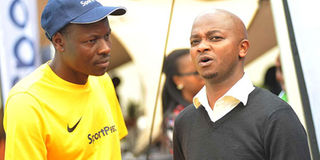Premium
SportPesa renews plea on taxation as team returns

Football Kenya Federation president Nick Mwendwa (right) chats with Harambee Stars coach Stanley Okumbi at the SportPesa All Stars luncheon on July 25, 2017 at the Intercontinental Hotel, Nairobi. PHOTO | CHRIS OMOLLO |
What you need to know:
- Gaming company SportPesa will terminate all existing sports sponsorships and leave the Kenyan market should a 35 per cent tax on revenue of gaming companies be effected from January as planned.
- SportPesa CEO Ronald Karauri on Tuesday said that the online betting company remains committed to supporting local sports but it hopes the government will review its decision on taxation “because no company can remain sustainable in the face of such high tax cap”.
Gaming company SportPesa will terminate all existing sports sponsorships and leave the Kenyan market should a 35 per cent tax on revenue of gaming companies be effected from January as planned.
SportPesa CEO Ronald Karauri on Tuesday said that the online betting company remains committed to supporting local sports but it hopes the government will review its decision on taxation “because no company can remain sustainable in the face of such high tax cap”.
“We are happy with the progress that we have made so far in local sports, but when I say we are here to stay, I am merely thinking positively. We are hoping that between now and January next year, the tax issue will have been reversed. If not, we will not survive,” he said.
Early this year, President Uhuru Kenyatta signed the 2017 Finance Bill into law. Among other things, Finance Act 2017 provides for 35 per cent tax on revenue of betting companies. The companies are also subjected to 30 per cent corporate tax.
Karauri was speaking in Nairobi at a function organised to welcome a select league team back in the country after a week-long tour of Spain for friendlies that ended on Sunday.
During the tour sponsored by SportPesa, the 18-man team played friendly matches against Spanish lower-tier league sides Cordoba and Sevilla Atlético in Malaga where they lost 3-0 and 1-0 respectively.
Speaking at the event, the team’s coach Stanley Okumbi said the players had learnt key lessons despite the loss. He said such friendlies would help coaches pick a strong team to represent Kenya in the African Nations Championship next year.
“There were so many lessons to be picked, especially in terms of the approach to games. Those players are faster and better in counter attacks than we are because of that speed. That is why we could not cope well in the first game. In the second game, we played better because we did better in terms of breaking their speed.





